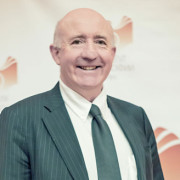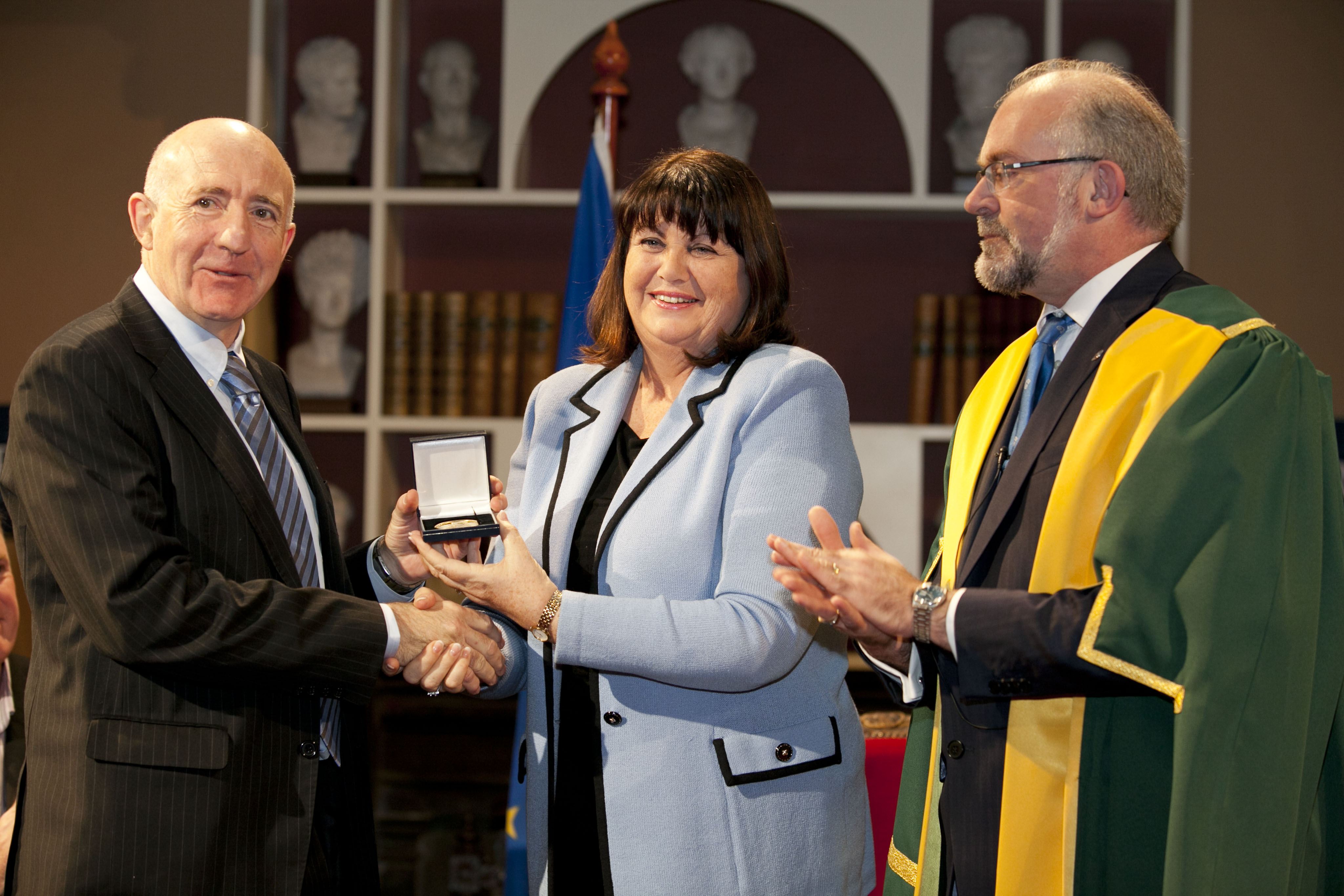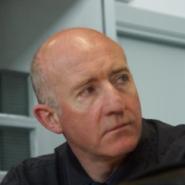I was born in Stillorgan, County Dublin, Ireland, and educated at Oatlands College Christian Brothers Primary and Secondary Schools, Mount Merrion, County Dublin. I completed my Leaving Certificate Examination in June 1970, and was awarded the Easter Week 1916 Commemorative Scholarship by the Department of Education for university study. I also received the Institute of Chemistry of Ireland Gold Medal for Chemistry in 1970.
University Education
I entered University College Dublin on a UCD Entrance Scholarship in Autumn 1970 to read English, French and Philosophy (1970-1973), graduating with a Double First Class Honours BA Degree in English and Philosophy in 1973.
I was awarded the Wilmarth Sheldon Lewis Graduate Scholarship to pursue graduate studies in Philosophy at Yale University Graduate School in Fall 1973. I graduated from Yale with MA (1974) in Philosophy, followed by MPhil in Philosophy (1976) and, finally, the PhD (1986) degree in Philosophy. My dissertation supervisor was Professor Karsten Harries and the other members of my dissertation committee were Professors Louis Dupré and Rulon Wells. My thesis ‘Nature and Mind in the Philosophy of John Scottus Eriugena’ was published by University Microfilms in 1986. A substantially revised version was subsequently published as a monograph by Cambridge University Press as The Philosophy of John Scottus Eriugena: A Study of Idealism in the Middle Ages, in 1989 (reprinted in paperback 2004).
While at Yale as a graduate student (from 1974-1978) I regularly served as a Teaching Assistant in Philosophy and also taught a College Seminar on James Joyce at Ezra Stiles College (Fall 1976). I was Teaching Assistant for Professor George Schrader (‘Persons, Roles and Social Structures’, 1974; and ‘Political Philosophy’, 1977); Karsten Harries (‘Philosophy of Existence’, 1975); Edward S. Casey (‘Phenomenology and Psychoanalysis’, 1976); Harry Frankfurt (‘Introduction to Modern Philosophy’, 1976) and Robert S. Brumbaugh (‘Ethics of Classical Greece’, ‘Philosophy of Space and Time’, 1978).
Professional Career
In 1979 I returned to Ireland and was appointed to a full-time Lectureship in the Department of Scholastic Philosophy at Queen’s University Belfast (1979-1982) working under the late Rev. Professor James J. McEvoy MRIA. I taught courses in Medieval Philosophy, especially Christian Neoplatonism, and Contemporary European Philosophy, especially phenomenology. In Autumn 1982, I took up a tenured Lectureship in Philosophy at St Patrick’s College, Maynooth, then a Recognized College of the National University of Ireland (1982-1989), now the independent Maynooth University. Since 1989, I have been Professor of Philosophy (Metaphysics & Logic) at University College Dublin. I have now been appointed as the inaugural holder of the Joseph Chair in Catholic Philosophy at Boston College.
University Administration
I play an active role in university administration. I served as Head of the Department of Philosophy at UCD for three terms between 1989 and 2001. I have been re-elected a member (elected by the Professoriate) of the UCD Governing Authority (2014-2018), having already served one term on the Governing Authority (2009-2013). I am a member of the UCD Academic Council, the UCD Research Ethics Committee, the University Committee on Honorary Degrees, and the Committee of Professors Involved in Mentoring. I also serve on the National University of Ireland Committee on Degrees on Published Work. I am Chairperson of the UCD Research Ethics Committee Working Group on Regenerative Medicine examining the ethical and legal issues surrounding the use of human embryonic stem cells in research. In March 2012 I was elected a member of the Selection Committee charged with the task of appointing the next President of University College Dublin (2014 -). In Maynooth, I was an elected member of the College Executive Council which reported to the university Trustees.
Contribution to the Profession
I have been a member of the Irish Philosophical Society (IPS) since 1979, and I have served as a member of the Executive, as well as Treasurer (1983-6) and Secretary (1986-9, 1999 – 2001). I have also served as Chairperson of the Royal Irish Academy National Committee for Philosophy (1992-1995), President of the Mind Association (1996-1997), Vice-President of the Mind Assocation (1997-1998). I am a Member of the American Philosophical Association, the British Society for Phenomenology, the Hegel Society of Great Britain, the Association of Philosophy Journal Editors, the Society for the Promotion of Eriugena Studies (SPES). I am a founder Member of the Kant Society, UK, and Patron and Founding Member of the Eckhart Society (UK). I was elected a Member of the Husserl Circle in 2000. I have been a Fellow of Center for Advanced Research in Phenomenology (CARP) and am now, since 2008, a member of the Board of Directors of CARP. In 2003 I was elected Member of the Royal Irish Academy.
I have a long standing involvement with the International Federation of Philosophy Societies (Fédération Internationale des Sociétés de Philosophie –FISP). I was elected Member of the Steering Committee (Comité Directeur–CD), Fédération Internationale des Sociétés de Philosophie (FISP) since 2003 (for the period 2003-2008; re-elected for the period 2008-2013). In April 2009, I was elected President of the Programme Committee for the XXIII World Congress of Philosophy scheduled for Athens in 2013. In August 2013 I was elected President of the International Federation of Philosophical Societies/ Fédération Internationale des Sociétés de Philosophie (FISP), for a five-year period from 2013 and 2018, charged with the organisation of the XXIV World Congress of Philosophy to be hosted by Peking University, Beijing, China, 13-20 August 2018. I am now Past President of FISP (2018-2023).
In October 2013 I was elected Member-at-Large to the Executive Committee of the Society for Phenomenology and Existential Philosophy for a three-year term (2013-2016).
On 26 October 2015 I was awarded an honorary doctoral degree in philosophy by the National and Kapodistrian University of Athens
Editorships
I am, since 1993, Founding Editor of the International Journal of Philosophical Studies. I was Co-editor with Nicolas DeWarren of the Contributions to Phenomenology book series, Springer publishers (2007 -2017 ), responsible for the publication of more than 30 volumes.
Academic Research
My research is primarily situated in three main areas: Contemporary European Philosophy, specifically phenomenology. See my Introduction to Phenomenology, Routledge 2000; Edmund Husserl: Founder of Phenomenology, Polity 2005; The Husserl Dictionary, co-edited with Joseph Cohen (Bloomsbury-Continuum 2012), Edmund Husserl’s Crisis of European Sciences: An Introduction, Cambridge 2012). I am also researching the History of Philosophy, especially the interrelations between analytic and Continental approaches in twentieth-century philosophy (see my Routledge Companion to Twentieth Century Philosophy, Routledge 2008); and Medieval Philosophy. See my The Philosophy of John Scottus Eriugena (Cambridge1989), and, with Stephen Gersh, Eriugena, Berkeley, and the Idealist Tradition, (University of Notre Press, 2006). I am particularly interested in the Neoplatonic tradition as well as in the evolution of the idealist tradition.
My current research focuses on specific philosophical problems from a phenomenological perspective, including the understanding of conscious experience, intentionality, perception, lived embodiment, and the understanding of other persons (through empathy or “mind-reading”), intersubjectivity and the constitution of the human person in the surrounding social world.
Funded Research Projects
I was Principal Investigator on an Irish Research Council for the Humanities and Social Sciences Collaborative Research award for a project entitled Discovering the “We”: The Phenomenology of Sociality (2012-2013). This project explicates and critically evaluates the phenomenological tradition¿s understanding of sociality, i.e. the manner in which subjects act cooperatively and engage intersubjectively in social relations. Phenomenological accounts of social relations (in Edmund Husserl, Martin Heidegger, Max Scheler and Alfred Schutz) offer rich insights that challenge current predominantly analytic discussions of collective intentionality and social ontology. Particular attention will be given to the experience of others in empathy and the ability to execute collective intentions with others in the shared social life-world.
I have successfully completed an Irish Research Council for the Humanities and Social Sciences Research Development Initiative (RDI) award for a project on The Phenomenology of Consciousness and Subjectivity (2008-2010). This project aimed to construct a considered, robust and reasoned defense of the phenomenological approach against theoretical challenges and criticisms that emerge from contemporary more naturalistic approaches of the mind, consciousness and subjectivity, criticisms that often dismiss phenomenological findings as ‘merely’ subjective, introspective (hence unreliable) and not amenable to objective assessment or lawful generalization. An informed theoretical clarification of phenomenology will potentially have a significant impact in the human sciences where theoretical concepts clustered around subjectivity, consciousness, and embodied selfhood are regularly deployed. As part of that research project, I have organized a number of workshops and international conferences at the Royal Irish Academy on issues concerning embodiment, subjectivity, intentionality and empathy. I am also interested in exploring the relationships between philosophy and other disciplines, including literature, psychology and the health sciences (e.g. I am currently participating in an interdisciplinary research project seeking to understand the meaning of human well being).
I am currently one of the principal co-investigators together with co-investigators, Dr Lubica Učník (Murdoch, Australia) and Professor Ivan Chvatík (Prague) in the ARC funded project on Judgement, Responsibility and the Life-world: The Phenomenological Critique of Formalism (2010-2012) focusing primarily on Husserl, Heidegger and Patočka. This international collaborative project investigates the role of responsibility and judgment in knowledge formation. Building on the work of the phenomenologists Edmund Husserl and Jan Patočka, the project will investigate the limits of formalist approaches to knowledge, arguing that such formalism depends on a problematic separation of knowledge-production from the life-world in which it is necessarily placed.
I have also been a collaborative investigator with Professor Jason Bell (Mount Allison University, Canada) and Professor Ullrich Melle (Leuven, Belgium) on a Partnership Research Grant entitled Discovering Canada’s Contributions to the Origins of the International Phenomenological Movement in the Winthrop Bell Papers funded by the Social Sciences and Humanities Research Council of Canada. The newly discovered papers of Winthrop Bell at Mount Allison, documenting his crucial role in bringing the “Golden Ages” of pragmatism and phenomenology into dialogue with one another, will allow for the creation of a dialect enabling communication between researchers in these two fields, which, despite important theoretical similarities and a shared historical ground, have remained largely distinct from one another. These papers were official restriction until 2012 owing to Bell’s secret service on behalf of the Canadian and British governments in post World War I Europe, and so have remained virtually unknown to scholars.
Current Research
I am currently the inaugural holder of the Joseph Chair in Catholic Philosophy at Boston College. I am now carrying out systematic research on the philosophy of the person and especially on the contribution of the phenomenological tradition to the idea of personhood. What is a person? What are the moral and metaphysical implications of designating someone as a person? Who count as persons? Are only humans persons? Or some animals? Can personhood be diminished or lost (in dementia or neurological dysfunction)? Is ‘person’ a Western concept only? What of other humanisms? What of posthumanist claims to enhance or transgress the human condition through biotechnology? Defining personhood is a field-defining challenge with enormous potential impact. In European law, persons command dignity, respect and protection. Persons matter, yet they are somewhat mysterious entities. No agreed theoretical account of the person exists across disciplines or cultures. Objectivist scientific approaches to the human typically concentrate on specific traits: mind, cognition, freedom, not personhood. Psychology typically examines “personality” rather than persons. Dignity and respect for persons are usually grounded in traits such as self-consciousness, rationality, or autonomous agency, yet such criteria set the bar too high, excluding some humans. Some naturalistic philosophical theories explicitly deny the existence of persons, or claim they are identical to their animality, or reduce their status to a function or role. I am proposing a radical investigation of the person using an up-to-date phenomenological approach (description of lived experiences as experienced by subjects) informed by critical hermeneutical appropriation of similar Eastern concepts (Buddhism and Confucianism, specifically China). This comprehensive, integrated account of persons aims to capture their ontological status and significance and robustly defends their dignity and integrity. Drawing on phenomenological insights, I hypothesize that persons are irreducible, multi-layered, developmental, yet fragile meaning-makers and value-generators with first-person and second-person perspectives in a shared interpersonal world of irreducible significance.



